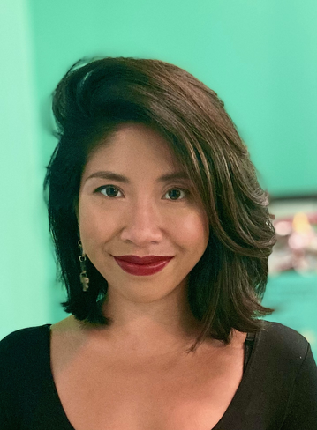The pragmatist tradition has no problem about being level-headed and getting muddy. There’s no bizarre or elitist hang-up in using (and re-forging) concepts from philosophy or other disciplines to make sense of contemporary issues or to promote social amelioration.
Tracy Llanera
 Tracy Llanera, University of Connecticut
Tracy Llanera, University of Connecticut
I AM AN AMERICAN PHILOSOPHER
Tracy Llanera is Assistant Professor of Philosophy at the University of Connecticut. She is author of Richard Rorty: Outgrowing Modern Nihilism (2020) and co-author of A Defence of Nihilism (2021).
What does American philosophy mean to you?
The term “American” is polysemous and pinning down a concept of “American philosophy” is tough. I think of American philosophy as a site of conversation, with pragmatism serving as its lingua franca.
How did you become an American philosopher?
I’m Filipino. I have a convincing American accent. I like to joke that my country was colonized a little too well by the United States; some of us grew up speaking English better than our native tongue.
I took my BA and MA at the University of Santo Tomas in the Philippines. My education had plenty of Ancient Chinese philosophy, Filipino philosophy, and Continental European philosophy. Religion was always in the mix since most of my classmates were seminarians on their way to becoming Catholic priests. While I learned a lot from my diverse training, I was routinely dissatisfied with the hesitation to use philosophy as a tool for examining social and political issues. Even when we were dealing with gritty, practical problems – and in the Global South, there’s plenty – the language we used in our classes and papers felt cushioned, obscure, and/or too holy, as if it were a sin for philosophers to get soiled by the inelegance of reality. This got in the way of clear thinking, at least for me.
The pragmatist tradition has no problem about being level-headed and getting muddy. There’s no bizarre or elitist hang-up in using (and re-forging) concepts from philosophy or other disciplines to make sense of contemporary issues or to promote social amelioration. As an approach, I’ve found pragmatism to be useful and liberating, whether I’m thinking about existential despair, or the words we use, or how hate festers in people.
How would you describe your current research?
I like philosophizing about extremist characters and ideologies; the title of a job talk I gave in 2020, for instance, is “Apostates, Sinners, and Nihilists”! My project on extremism examines why some people leave hate groups like the Westboro Baptist Church and how misogyny takes a paradoxical form in the Alt-Right. My project on pragmatism and the politics of language looks at how the word “sinner” functions as a toxic term in the Philippine Drug War. My project on nihilism challenges the orthodox view in the history of philosophy that nihilism is an existential malaise that human beings must overcome. Instead, it argues that nihilism is a philosophical problem that can be outgrown through pragmatism.
To deal with all the stuff I’m interested in, having a pretty broad philosophical vocabulary is important. I would describe my research as being at the intersection of many areas, including social and political philosophy, philosophy of religion, pragmatism, feminist philosophy, and social epistemology. Recently, I’ve also been involved in activist work with Filipina philosophers – please check out Women Doing Philosophy. I’m the editor of Resilience: The Brown Babe’s Burden, the first collection of writings by Filipina philosophers (in progress).
What do you do when you’re not doing American philosophy?
My pleasure is sniffing. I’m a sniffer. I’m part of online fragrance communities and join “sniffy” parties in pubs and public parks in Sydney, Australia. I follow the work of independent perfumers or “noses”. My favorite Australian perfumers are Teone Reinthal of TRNP, Jocelyn Fullerton of Cult of Scent, Al Manlé of Anka Kuş Parfüm, and Corey Newcombe of Criminal Elements. Some of my favorite American perfumers are Laurie Erickson of Sonoma Scent Studio, Terry Bozo of Kyse Perfumes, and John Biebel of January Scent Project. I’m also a fan of the work of Liz Moores (England), Prin Lomros (Thailand), and Francesca Bianchi (Italy).
I have an armada of fragrances and some of my constants are Anubis by Papillon Artisan Perfumes, Mandarava by Parfum Prissana, Misia by Chanel, and Oud Ispahan by Dior.
Smells, to me, are transportive. I like matching my mood with smell the way people choose their music or poetry. That said, I have resisted all attempts to intellectualize my relationship with scents. Thinking too hard about smell takes the magic out for me. I also can’t do molecule-talk (trivia: petrichor is the smell in the air after it rains).
What’s your favorite work in American philosophy? What should we all be reading?
The work that drew me to pragmatism is Richard Rorty’s Contingency, Irony, and Solidarity (1989), a text that’s probably even more divisive in philosophy than Philosophy and the Mirror of Nature (1979). The reason is philosophical and personal. Egotism—which springs from the notion of the self as “the cold, self-interested, calculating psychopath,” as Rorty puts it—is the scourge of Western philosophy. If you peel away all the “relational” extras, moral philosophy defaults to the egotist as its model of the rational subject.
While Filipino culture doesn’t have room for that level of blistering narcissism, our conception and lived experience of the social can be asphyxiating. Having private joys and engaging in projects of self-creation are usually seen as shameful or quirky or unimportant to human flourishing. Contingency, Irony, and Solidarity helped me reimagine and attempt to ease the tension between the public and the private using the idea of self-enlargement. The experience of reading that book for the first time was edifying then, and re-reading it now still is, and that’s why it’s my favorite.